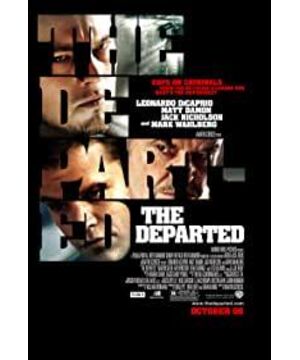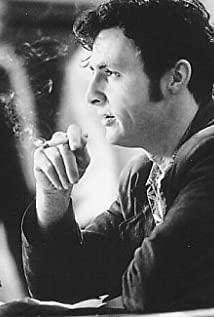When I watched the front on the first day, I felt that the film just borrowed a Hong Kong-style outer packaging bottle, which contained authentic foreign wine. Except for the identity of the protagonist and the plaster on Leo’s arm, there is no Hong Kong version infernal at all. shadow. Later, when two undercover agents reported messages via mobile phones, I began to smell Hong Kong, especially when the silly characters and their companions played the boring game of "the police who ignore us", I also started After playing "Let's Find the Difference", I found that the two versions gradually approached in plot, and even overlapped. It's just that this time it became telling Chinese stories in English.
The overall feelings of the two films are very different. One is like a rough boxing, and the other is like a tai chi that is both tough and soft. It is said that whoever wins or loses is not good, but they are all very good-looking. The American version of boxing is naturally boxing, and it’s full of punches and punches, and the climax is one after another. The enjoyment is enjoyable, but the eyes are a bit sore after seeing it for a long time, and it is all based on external forces. The tricks are limited. Anyone who sees more Can learn two tricks, let alone aesthetic fatigue. The Hong Kong version is like Tai Chi. Although it is not as combative and confrontational as boxing, its viewing and artistry is incomparable to boxing. I have never seen anyone performing boxing, while Tai Chi performances stretch like clouds and flowing water. Smooth, changeable, dynamic, dynamic and natural, practice the muscles and bones on the outside, and breathe in the inside...Eh, where did you go. The same goes back to the movie. The American version of Infernal Affairs has a tighter rhythm and a fancy fight. Some sticks pierced people's faces and bullets hit the knees, making the eyes eat a feast, but the only thing I remember after watching them is these hot spots. The camera, there is no urge to watch it again, and I believe that more explosive movie scenes will soon be replaced. It’s been several years since I watched the Hong Kong version of Infernal Affairs. The details and scenes are a bit unclear, but the film’s murderous atmosphere, gloomy style, tension that can be created without bullets and blasting, and depression and heaviness after watching the movie My mood is still fresh in my memory. No film can replace that kind of texture and shock. I call it the first "cold violence film" in Hong Kong. Take the scene of the police chief falling from a building and dying for his job as an example. The American chief Kunnan had blood splattered three feet and his face was spent, and then Leo ran over to pick up the big painted face and made a series of hysterical movements, straightforward and straightforward. It was jaw-dropping; in the Hong Kong version, Huang Qiusheng fell on the roof of the car, and blood flowed from his forehead into his ears, which did not affect the expression of the deceased at all. Then Tony Leung walked over with the sound of the heavenly theme music expressionlessly, and the sadness was about to come out. .
From the perspective of the script, the first half of the US version of Infernal Affairs is a bit slow. The half-hour longer than the Hong Kong version of the US version is probably due to it (the other half of the credit belongs to the love scene of two men and one woman. ), and the rest of the excitement basically uses the Hong Kong version of the plot, which is truly the best Oscar "adapted" screenplay. However, I have watched the Hong Kong version of Infernal Affairs twice, and there are always parts of the plot that I didn’t understand. Even though I was cut off when watching the US version, it not only didn’t affect my understanding of the plot, but it also solved the problem for me. Questions about the Hong Kong version. For example, the silly strong in the Hong Kong version actually defended the quasi-undercover Chen Yongren in the key undercover guessing action. Although he inherited the heroic tradition of Hong Kong-style gangster movies, he violated the previous plot set of silly strong to the boss. The premise of incomparable loyalty; while the US version has given the status of stupid undercover agents, although the number of undercover agents is a little unreliable, but it is more logical. You must know that there are no good people in the underworld, let alone. Mixed with the capitalist underworld. In addition, some small details added in the US version also make the process of two undercovers successfully revealing each other's identity more clearly and rationally. The two films once again proved that American films pay more attention to the truth and smoothness of the story, while Hong Kong films pay more attention to the emotion and atmosphere of the story. Therefore, the people of Hong Kong spread a good and fascinating story, and the Americans rejoiced to tell the story even more vividly after hearing it.
Although the performance of the US version does not have the atmosphere of the Hong Kong version of the academic school, but it can also convince people with reality. Leo squatted himself to death, openly showing a young man who was gradually lost and violent in his undercover work, but it was a pity that the script gave him only enough space to express this. Damon, on the other hand, was the opposite. The script gave him a lot of play to play, but only in exchange for the actor's dull expression and constantly flashing eyes. Needless to say, Nicholson, the old drama bone, took away all the limelight brilliantly, and even the director was called by him. Otherwise, how many other protagonists would practice the sudden death method, with a flash of blood and no corpse on their faces. He was carried down. Just before he died, he was lively, with expressions, movements, strange body shapes and close-ups. If he was seen by Xiao S, he would say, eh, you want to be popular too. Wahlberg didn’t say it well. I would watch English subtitles when it came to his play, so that I could appreciate his various swear words and learn a few words by the way to evaluate his acting skills. He was able to nominate an Oscar. The best supporting actor can only be attributed to a supernatural event.
As for the original American version of the movie’s death-and-death ending, it’s confusing. It’s stupid and weird. But considering that you don’t have to wait for the first three to end the bad guys, it saves him in the sequel. Doing evil can be regarded as a great pleasure.
Generally speaking, both films are successful, because they both found the tone that suits their respective cultural orientations, and throughout the whole process, the emotions conveyed by the film are brought to the fullest. The American version of Infernal Affairs shows us a dirty and bloody black-and-white world. Survival is the direct and sole purpose. In this world, for this purpose, human nature is undoubtedly exposed, and the film is true and credible. The Hong Kong version of Infernal Affairs is like an elegant and exquisite parable of enlightenment, in which the characters are blurred and eventually lose their identity. In this process, they constantly search and reflect, trying to change their own destiny, which is very in line with Hong Kong at that time. The decline of the movie and the determination of Hong Kong people to rescue the market. Just like at the end of a scene where the male protagonists reveal their identities on the rooftop, the US version is full of curses and fights, while In the Hong Kong version Andy Lau sincerely said "Give me a chance, I want to be a good person", while Tony Leung answered calmly " Sorry, I am a policeman".
View more about The Departed reviews











